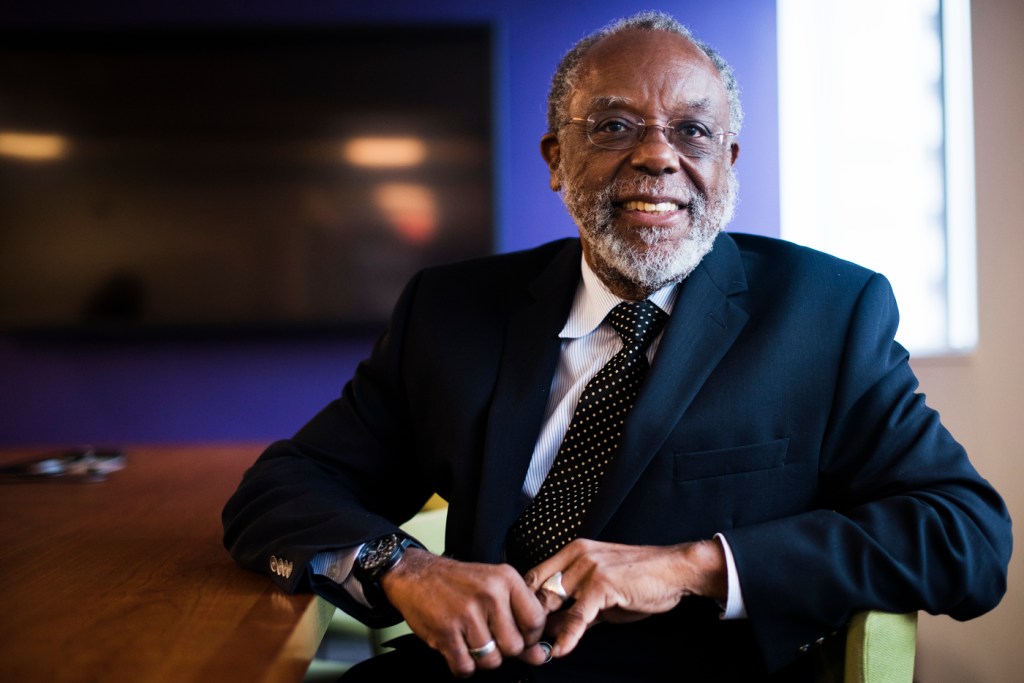For public policy leader, ‘caring about other people is intrinsic to the work we’re doing’

Ted Landsmark’s current research draws upon efforts by cities to address demographic changes and racial inequities, resilience, gentrification and affordability, global economic needs and local education, waterfront development, re-branding through design, and data-driven management to better inform emerging urban planning strategies. He recently facilitated symposia on the implications of expanding autonomous vehicle uses, urban ecosystems involving wildlife in cities, and the application of an elevator company’s vertical transportation knowledge to reducing horizontal congestion.
In short, the man has breadth—and he brings great joy and passion to his work.
“The core value of what we’re doing is that changes in urban and regional policy have to achieve social justice and equity among the diversity of people who are living in and near cities,” Landsmark said.
An appointee to Mayor Martin J. Walsh’s Boston Planning and Development Agency Board of Directors, Landsmark joined Northeastern this year as Distinguished Professor of Public Policy and Urban Affairs. He was also appointed the new director of the Kitty and Michael Dukakis Center for Urban and Regional Policy.
“This is a wonderful time to be on this campus because of the diversity and depth of the scholarship and research going on here and the implications of that work for cities here in the United States and globally,” he said. “Urban and regional policy planning involves so many elements of data management, human impact, and efforts to achieve social justice, and it’s clear that the Dukakis Center will be in the midst of assessing the implications of a number of issues that will affect society over the next couple of decades.”
The breadth of his research is equaled only by the breadth of his career. Landsmark holds a doctorate in American and New England studies from Boston University and professional degrees in law and environmental design from Yale University. After graduating, he worked at the Boston-based law firm Hill and Barlow, which represented some of the leading architects in the country. His first boss there? None other than Michael Dukakis, Distinguished Professor of Political Science at Northeastern.
“It’s so ironic,” he said, letting out a belly laugh.
When Dukakis became Massachusetts governor, he appointed Landsmark to the board of the Massachusetts Bay Transportation Authority, where he was deeply involved in planning and policy efforts. He’s also served on the boards of the Museum of Fine Arts and the Institute of Contemporary Art, and once owned an art gallery, Alchemie, near the Fort Point Channel.
Landsmark also served for 17 years as president and CEO of the Boston Architectural College and as vice president of the American College of the Building Arts in Charleston, South Carolina, where he worked with students focused on preservation artistry—namely, blacksmiths, timberframers, and the like. He was a dean at the Massachusetts College of Art and has worked at the Massachusetts Institute of Technology, Harvard University, and the University of Massachusetts.
Landsmark said a guiding principle strings together his diverse career. “Every day there’s a solution to be developed out of a sense of passion for the people, cultures, and the societies that we’re asking to learn to live together. It’s hard not to be passionate about that,” he said. “Caring about other people is intrinsic to the work we’re doing. And planning for people we may never meet or know is intrinsic to moving forward with a socially-just agenda for developing cities.”
To that end, he’s leading this semester’s Myra Kraft Open Classroom series, which examines broad political issues from a range of perspectives. This semester’s topic is “Boston in 2030,” which brings together elected officials, nonprofit leaders, and academic scholars to assess how Boston governmental policies are contributing to transforming a region of changing demographics. Landsmark also plans to lead the Dukakis Center toward a continued path of social justice through public policy.
Even Landsmark’s hobbies, seemingly as far removed from his work as could be, are woven into this central idea. Landsmark collects banjos, several of which are hanging in his office. He plays them too, but “not well,” he said. The collection has more to do with the instrument itself, which, having wound its way cross-continentally through global history, is what’s significant to him. “I keep them in my office as a reminder of how those things that a particular group feels that it owns have a way of being transferred and shared among cultures in ways that we don’t always think about,” he said.





